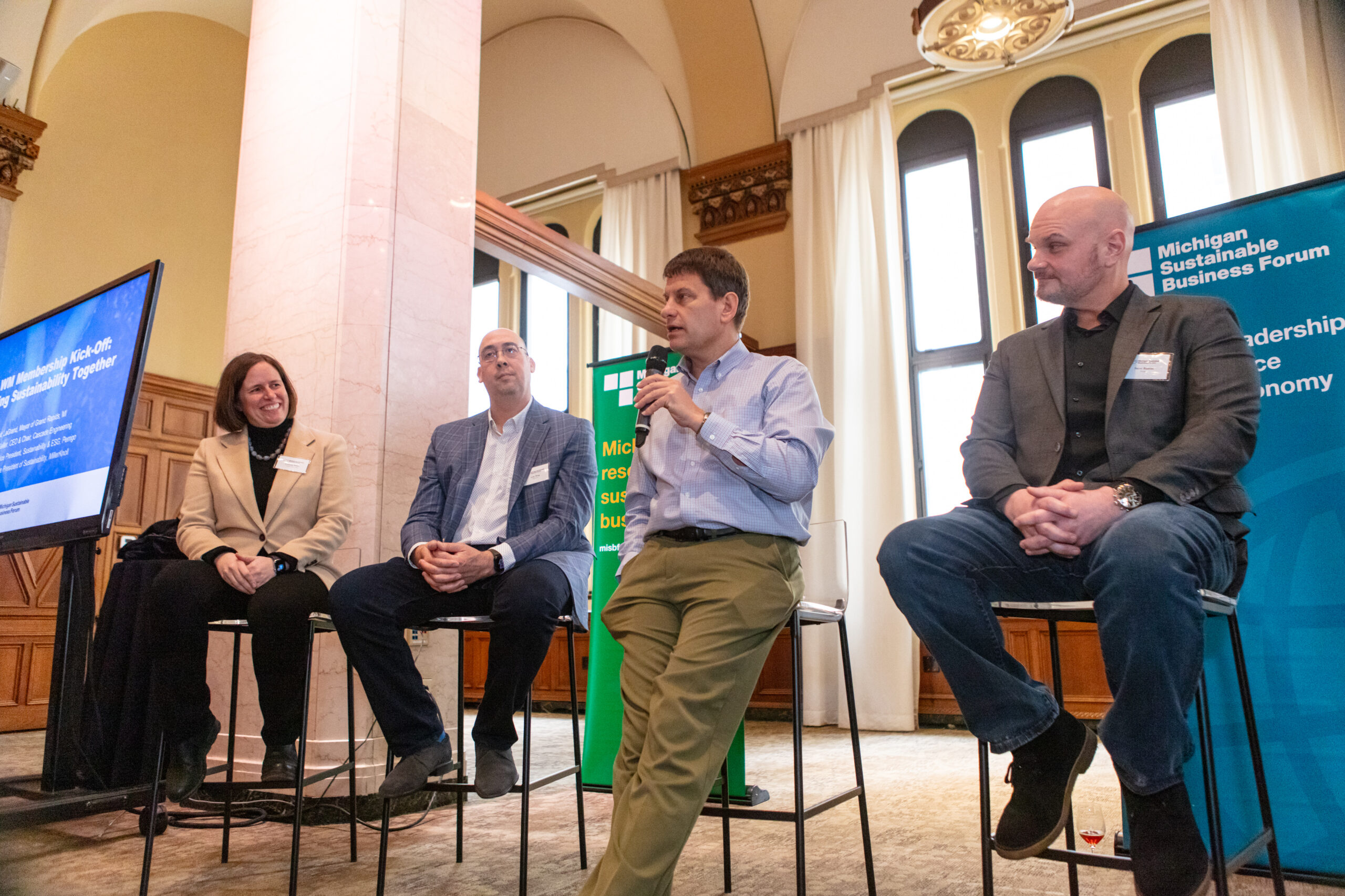
Innovation, Optimism, and Alignment: Insights from West Michigan’s Sustainability Leaders
April 8, 2025
Michigan Sustainable Business Forum held the 2025 West Michigan Membership Kickoff event in Grand Rapids to bring sustainability leaders together and discuss key priorities for climate leadership, circular economy solutions, and social impact in the year ahead.
MiSBF invited four exceptional sustainability leaders to share their thoughts during a panel discussion on the progress being made, what characterizes this momentum, and how we can continue pushing the boundaries to create a regenerative economy.
Sustainability leaders remain optimistic as priorities converge for all stakeholders.
Despite the chaos in the national news cycle, sustainability leaders are finding reasons to stay hopeful that meaningful progress toward a more sustainable world is not only possible—but already underway.
Steve Ramus, VP of Sustainability and ESG at Perrigo, pointed to the European regulatory landscape as a significant force aligning public and private sector efforts.
“40-50% of our company operates in Europe. There’s the European Green Deal and regulations like the Corporate Sustainability Reporting Directive, the CSRD, are definitely dominating,” said Ramus. “A lot of countries are starting to align what they view as material.”
Gabe Wing, VP of Sustainability at MillerKnoll, echoed the importance of regulation but noted that other stakeholders play a powerful role.
“I think more importantly, it’s what we’re seeing from our customers,” he said. “Our customers are demanding that we deliver more sustainable products in the marketplace. And to me, that intersection between regulations, our customers, our values, even our investors, has the stars aligned. I’m more optimistic at this point than I’ve been at any point in my career with sustainability.”
For Christina Keller, CEO and Chair of Cascade Engineering, optimism stems from the potential she sees in her own community.
“I think what excites me most right now is really the opportunity that we have right here in West Michigan. We are large enough to have a lot of examples of the problems that are happening the world over, but we are small enough and cohesive enough to really be an example of how to solve those problems…We’ve really built a network and a web of folks that are focused and aligned.”
David LaGrand, Mayor of Grand Rapids, emphasized the role of cities in sustainability efforts.
“The cleanest and most environmental thing you can do is live in a city. And the fact that more people want to do that means that my facilitating that is really important.”
LaGrand also highlighted how Grand Rapids can set an example for mid-sized cities nationwide, discussing the importance of increasing density through new housing developments and securing public support for large-scale solar energy projects to power the city’s homes and businesses with renewable energy.
Collaboration to achieve sustainability goals is driving innovation.
In addition to alignment around priorities, panelists explored how collaboration and innovation are helping organizations and communities reach their sustainability goals.
“When you look longer term, the social and environmental things naturally come into view,” Keller said, adding that taking diverse perspectives into account has led to the creation of important circular economy solutions at Cascade.
Wing shared an example from MillerKnoll, where his team partnered with product designers to create a vegan leather material—one that addresses environmental concerns while enhancing product durability and quality.
Ramus discussed innovation from the perspective of a highly regulated industry like pharmaceuticals.
“At its core, sustainability is about waste elimination,” he said, citing an initiative at Perrigo that ties employee compensation to packaging waste reduction. The strategy has already prevented the production of millions of pounds of waste. He also stressed the value of transparency—making sustainability goals and progress visible to the people responsible for implementation.
LaGrand reminded us of the collective power of cities to drive human flourishing.
“ People coming together succeeds. Cities have been thriving and winning for a long time,” he said, noting that cities are a testament to human ingenuity—and that we all have a role to play in ensuring they continue to serve their people, particularly through institutions like education.
We’d like to thank our featured speakers–David LaGrand, Mayor of Grand Rapids; Christina Keller, CEO & Chair of Cascade Engineering; Steve Ramus, Vice President, Sustainability & ESG at Perrigo; and Gabe Wing, Vice President of Sustainability at MillerKnoll–for their time and thoughtful responses.
